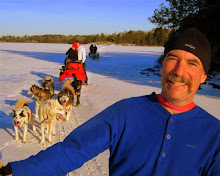As I sit here this morning by the fire, after reading a few stories in Jeff Hull's Streams of Consciousness, I think about Hull's stream fishing in North and South America. He writes of the grayling fishing in Montana and always in "Chasing Grayling" there is a sense of loss -- of the Grayling fish, of parts of the stream ecosystem to human development, of the loss of Hull's spiritually sensitive experience on the Big Hole River. Hull watched a young fisherman catch and injure the same fish that Hull had carefully caught and released earlier that day. Hull's sorrow and rage at the "progress" wrought by man that means a loss of whole wild nature runs like an undertow through the sea of his beautifully written descriptions of waters that he has fished.
In "Knots" Hull uses the metaphor of fishing knots to look at, among other things, the knots that people's desire end up making in trying to possess wild nature - trophy homes, loss of wildlife habitat, pollution of air, water and sight - not a rant by the author but a measured plaint to what is loss for everything living.
In "Estancia del Zorro" a University writing project about the impact of free trade on a fully capitalist Chile leads to a Patagonian fishing trip. Amidst rapidly rising extractive industries, unburdened by environmental regulations, Hull fishes on a guided trout fishing excursion in the relatively under-fished Patagonian streams. Here, his guide Rodrigo dreams of going to flight school to learn to fly helicopters so he can guide fishermen to waters that are unfished by anyone, an example of modern man's drive to "progress" beyond where other men have been, to make a mark for oneself in a new way.
Though I have focused on just one current in the stream of Jeff Hull's writing, to the exclusion of his Hemingway-like description of sporting people, dogs, waters and woods, what I came away from was the bittersweet sense of Hull's and my loss - of our youth, of innocence, of part of our birthright to land and water that is healthy, where man is not the dominant species. Yes, the wild is still out there, but it is mostly just background to man's dominance and "progress".
Saturday, March 01, 2008
Subscribe to:
Posts (Atom)
